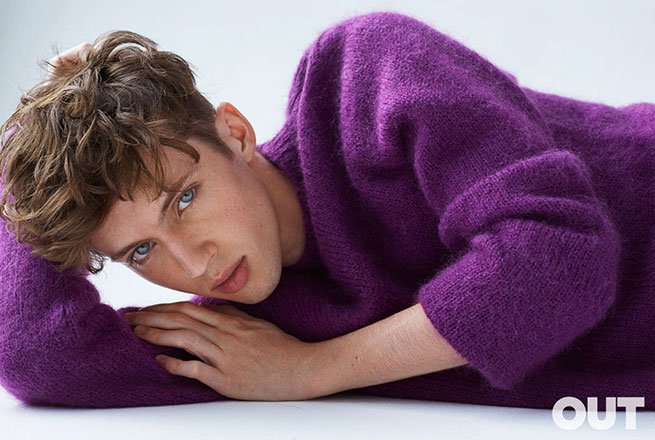The Internet superstar discusses coming out, growing up Jewish, and keeping nothing private.
“I had a lot of anxiety coming into this year,” Troye Sivan says, curling his narrow shoulders closer to the screen. He squints into the FaceTime connection and clarifies: “Good anxiety and bad anxiety.”
His first full-length album, Blue Neighbourhood, was released last December to decent sales and strong reviews for its earnest, dreamy electro-pop. He did a short burst of live shows, his first ever real onstage performances—and promptly got sick, canceling three others. He retreated to his parents’ house for a month of R&R and a reality check.
“This is going to sound so gross and braggy,” he warns. “But I had just done [Jimmy] Fallon, I was on the cover of Rolling Stone Australia, and I had booked Ellen. I was like, What the fuck? Anything else after this is a bonus. This is exactly what I’ve always wanted. And when I’m not in my own head about it, I have the best time.”
Sivan is nearly 21. When he was 2, his family moved from South Africa, where he was born, to Perth, on Australia’s western coast. By 14, he was a modestly successful child actor, appearing as a younger Hugh Jackman in X-Men Origins: Wolverine. Three Spud films, opposite John Cleese, followed over the next five years.
At 12, he started making YouTube videos. Nothing crazy: mostly just him talking to the computer about his life. At 15, he told his parents he is gay. Three years later to the day, he made a vlog coming out to his by then-half-million followers, a straightforward declaration that probably surprised few. “This is not something that I’m ashamed of,” he said, “and it’s not something that anyone should have to be ashamed of.”

There are thousands of coming-out videos on YouTube—he watched all he could find before making his own—but Sivan’s was a kind of tipping point for the now-ubiquitous subgenre, many examples of which are made by people who cite his viral clip as motivation to take that leap. (#WeAreProudOfYouTroye trended that night worldwide.) Eight minutes long, it’s a lot like Sivan himself: sweet, articulate, unassuming, matter-of-fact. Only afterward do you realize how compelling he is despite a lack of any real dramatics.
He doesn’t have a tragic backstory—his parents were accepting and loving. He didn’t quite fit in with all the other kids at school (“Making YouTube videos wasn’t something that scored me cool points, by any means”), but he wasn’t particularly bullied. He wrote and posted a song inspired by the John Green novel The Fault in Our Stars and got an email from a record label wanting to sign him. He’s had it pretty easy, which he’s well aware of.

But he’s also made more of himself than most of us ever will. His 4 million YouTube subscribers, 3.6 million Twitter followers, and 3.6 million Instagram fans are really just the starting point. At VidCon, an annual meet-the-YouTuber convention that now draws 20,000 fans, devoted kids wait for him in meet-and-greet lines for a quick hug and a photo. The social-media stardom is no small advantage; according to one industry expert, Sivan was probably already pulling in six figures in advertising and brand deals.
Now, backed by that massive built-in fan base, he hasn’t abandoned his roots so much as gone back to basics. And it’s turning out to be hard as hell.
Usually when he’s received a question about how the world works—how to bake a cake, how to have safe sex, how to understand the history behind the HBO adaptation of The Normal Heart—he has Googled, then shared his findings in a video. (“I learn so much online, but there’s so much that’s not true on the Internet,” he admits.) But no amount of research could prepare him for the grueling schedule of promotion and a 40-stop world tour.
“Like, wow, there’s a lot of people relying on me to make this tour happen, and also it comes down to the fact that physically I’m very thin. I have the same body I’ve had since I was 13.” He’s a little sniffly now, trying to beat back a recurring case of sinusitis because of a deviated septum, which will require surgery and force him to postpone two more dates in Canada. “I sort of ran myself into the ground.”

But he’s begun to tap into the heady rush of performing. “I’ve been looking at people’s faces a lot more during a show, and it’s been getting me insane amounts of joy. I see kids closing their eyes and singing the lyrics, and I see kids with huge smiles on their faces, or I see kids that are on a date. I see kids who are proud of themselves and proud of me, and it just really makes me happy.”
He hasn’t quite hacked the code of a confident rock star—he’s more inclined to lilt and sway, and has been compared by more than one critic to a Muppet. But he’s piecing together the parts: “If I lift my arms at this particular moment,” he says, still astounded, “the crowd sings that line back to me, and that’s an awesome moment in the show.”
Most of the album is basically “singing about boys.” It’s as unashamed in its male gaze as that coming-out video was unapologetic. Even in a trilogy of moody videos (for “Wild,” “Fools,” and “Talk Me Down”) that depict a love story between childhood friends, it’s not Sivan’s character who struggles with his sexuality.

But there’s one track on Blue Neighbourhood that generates a particularly strong reaction. Sivan was raised Jewish, if “not super-religious,” and in “Heaven” he tackles how at around 14 he started to wonder why being gay meant everything might get harder. “Writing that song was very therapeutic to me at the time,” he says. “It was me thinking about how hard I try to be a good person and then feeling like, before I even opened my eyes as a little baby—because I think I was born gay—I was a sinner. All of those are very standard, but very confusing and hurtful conversations that you have to have with yourself as an LGBTQ person.”
“Those kinds of songs mean a lot to me,” says Fun. guitarist and Bleachers frontman Jack Antonoff, who co-wrote “Heaven” with Sivan and Alex Hope and whose own biggest hits blend serious angst with similar sing-along, anthemic moments. “It has really powerful lyrics. You’re not watching someone deal with their pain—you’re internalizing it. It doesn’t read like a diary. It kind of reads like you wrote it.”
Then, at a live show, Sivan asked, “Who’s LGBTQ up in here?” Half the audience put their hands up, smiles on their faces, and when he hit the chorus—“if I’m losing a piece of me, maybe I don’t want heaven”—he couldn’t believe how loud it got. “That moment where you take on that responsibility and feel that empowerment, seeing that in a physical form looking back at me, singing those lyrics back at me was…” He shakes his head. “It was a life-changing moment.”
The feedback loop doesn’t stop there. The week after our interview, a young woman passed Sivan a note before a show in Washington, D.C., asking him to read it aloud from the stage. “Are you sure?” he asked, before announcing to the crowd—and her mom—that the 14-year-old is bisexual. Cue an avalanche of cheers, hugs, tweets, and videos of Kelly and her mother crying and embracing after the show—which then themselves went viral. For all his candid confessionals and nakedly emotional lyrics, there’s one thing Sivan doesn’t want to be quite so open about: his relationship status. “I feel like I share everything about myself, like everything. That’s the one thing—I should keep something to myself.”

Naturally, the one hard line he draws is what attracts the most scrutiny, from warring factions of fans who are very, very sure that he is dating or has dated either Tyler Oakley or Connor Franta—gay YouTube stars in their own right—or both of them.
So of course a line in Blue Neighbourhood’s liner notes thanking his “beautiful boyfriend”—along with reported sightings of Franta on tour with Sivan and with him in Perth—created a minor frenzy.
“It was important to me to pay tribute to that person and thank that person,” Sivan says carefully, “because I think they were super instrumental to the process of making the album. I don’t think I could’ve done it without them. As far as defining that relationship and defining who that person is and everything…”
He trails off a little, admitting some regret and second-guessing himself for running with that very public thank-you. When asked if he feels more protective of his privacy or simply unsure, with only a couple years of serious dating under his belt, if whatever he’s doing will last, he nods immediately. “That’s pretty much it for me. I don’t even know what’s going on, so I don’t really want to put anything on paper. I’m just so…20. I’m never sure how to define anything in a magazine or in print. It seems very permanent.”

Arguing whether YouTube-first stars have real power is as useless as it was to dismiss Beatlemania. They do. Here’s our brave new world, one where both Sivan and his fans are setting the agenda.
One Friday night in March, Sivan announced that his newest single, “Youth,” a catchy, bouncy bright-light embrace of his own inexperience, was on sale on iTunes for 69 cents. Then over the course of a couple of hours he begged and sweet-talked his Twitter followers to propel it into Apple’s top 10 singles.
Never mind that you could stream it as many times as you wanted for free, or that his most devoted fans may have already bought the whole album. Troye asked, and they answered.
Meanwhile, Sivan shrugs off the worry that the lyrics to “Youth” are almost too pat, a perfect generational think piece about whether the kids are all right. “My youth is yours,” he sings, like it’s a baptism, a gift of everlasting innocence and sweet, easy love no matter the listener’s age.
“It’s about not knowing where you are going and finding someone, and not knowing what the two of you are or aren’t. How because you’re young, there are not necessarily a lot of consequences, and it’s OK. It’s about that feeling being kind of intoxicating.”
Source: out.com
Photos: news.jedroot.com








